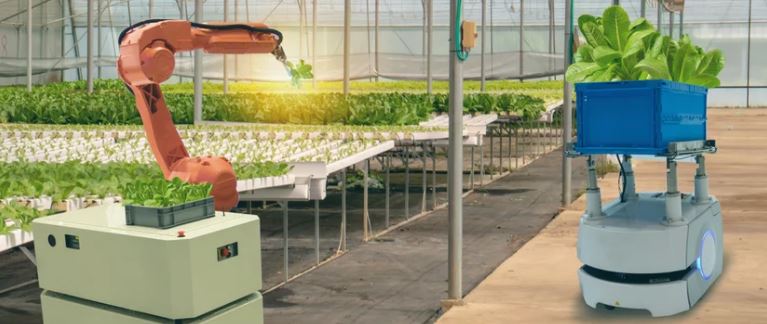Sustainable production with robotics – the technology of the future?
Adriana Glazer | 18. June 2021
For years, robots have been considered drivers of productivity and efficiency. With the latest technologies and robot types, the degree of automation in the manufacturing industry is continuously increasing. Industrial robot support allows complex, tiresome, and dangerous work to be automated and performed quickly. The tasks range from vacuum cleaning robots to bomb defusers. In industrial manufacture, robots can be used for point automation or integrated system solutions. Although companies are using robotics and automation with increasing frequency, they have so far rarely made the leap to fully integrating complex robot systems. Machinery that appears to come from a science fiction film increases productivity and reduces costs, but has other major advantages that are often overlooked: sustainability and energy efficiency.

Sustainable production and robots: how do they fit together?
- Reduce energy costs
A major incentive for automated manufacture is energy cost reduction. Modern technologies of the latest robot generations allow completely integrated manufacturing processes developed specifically for automation with regard to the energy they consume. Energy efficiency results from the optimisation of individual manufacturing processes, which taken together accelerates production. Robots work without interruption and perform several tasks in a single step. You do not need any light, heating or direct supervision, which results in significant savings in energy costs.
- Minimise production waste and material consumption
Cutting-edge technologies rely on extremely high-precision movements. This minimises errors and optimises planning of necessary production material. This in turn minimises production rejects and excess material. For instance, in automotive production, the amount of adhesive or paint required for an individual component can be calculated and programmed exactly.
- Replacement parts with robots instead of large systems
Robots can be programmed in a wide variety of ways, making them much more flexible than static machines. Sticking with the example of automotive production, replacement parts continue to be needed years after a series has stopped being produced. The manufacturer can use a modular robot system to simply retrofit the production process. Large systems that require a great deal of energy and space and a large number of employees can be eliminated.
- Support for the recycling process
Robots can help close the circuit that consists of production, sorting and recycling of used goods. Integrated vision systems allow them to detect individual components and disassemble them into recyclable parts.
- Humans and machines: the strongest team
The question now is how well robots can be integrated from a social point of view. According to a study conducted by the Massachusetts Institute of Technology (MIT) in co-operation with BMW, the motor vehicle manufacturer, mixed groups of robots and humans are about 85% more productive than teams made up only of robots or only of humans. (1)
As has been mentioned, robots can also perform a number of tiresome, repetitive, or even dangerous tasks, relieving stress on humans. This creates capacity for more productive tasks for employees.
Robots in production: a technology of the future
Robots in manufacture represent a great opportunity for improving energy and resource consumption and for circular recycling. From a social point of view, robots can have positive effects on individual production processes thanks to human-machine collaboration. In robot design, many modern manufacturers use lightweight components, ensuring that as many of them as possible can be recycled. Another factor that makes robot technology sustainable is its durability. Many robot manufacturers, like igus, make it possible to safely use robust robots that require no maintenance or regular lubrication. This is the only way to improve technology and production processes while keeping investment low.
(1) Financial Times, 5 MAY, 2016
Also read: Automated plastic production? Yes, with igus® Low Cost Automation
